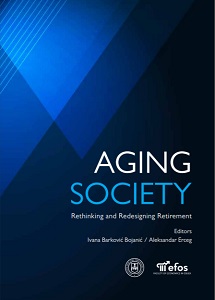NORMAL AGING
NORMAL AGING
Author(s): Tatjana Bačun, Ivan Lekić
Subject(s): Cognitive Psychology, Clinical psychology, Health and medicine and law
Published by: Sveučilište Josipa Jurja Strossmayera u Osijeku, Ekonomski fakultet u Osijeku
Keywords: normal aging; older age; chronological age; biological age and chronic diseases;
Summary/Abstract: Aging is a physiological process that, affected by genetic factors, different lifestyles, and environmental exposures, leads to senescence and death. With increasing age, changes in organs and organ systems occur, leading to progressive deterioration and damage to their function, as well as chronic diseases and functional disability. Older age is defined as a chronological age of 65 years. The average life expectancy in Western Europe and the United States is 74 for men and 80 for women. It is expected that by 2025, there will be as many as 82% of people over 60. The elderly often suffer from presbyopia and hearing loss, their muscle mass decreases with an increase in fatty tissue and diminishing bone mineral density, their skeleton becomes more fragile and their body height decreases. Movement and mental reactions become slower. Cardiac minute volume, the vital capacity of the lungs and kidney filtration capacity decrease, while the function of the digestive system generally remains preserved. Special characteristics of organ systems of the elderly are an indispensable subject when it comes to the development of medicine and the development of civilization in general.
Book: Aging Society - Rethinking and Redesigning Retirement
- Page Range: 17-37
- Page Count: 21
- Publication Year: 2020
- Language: English
- Content File-PDF

